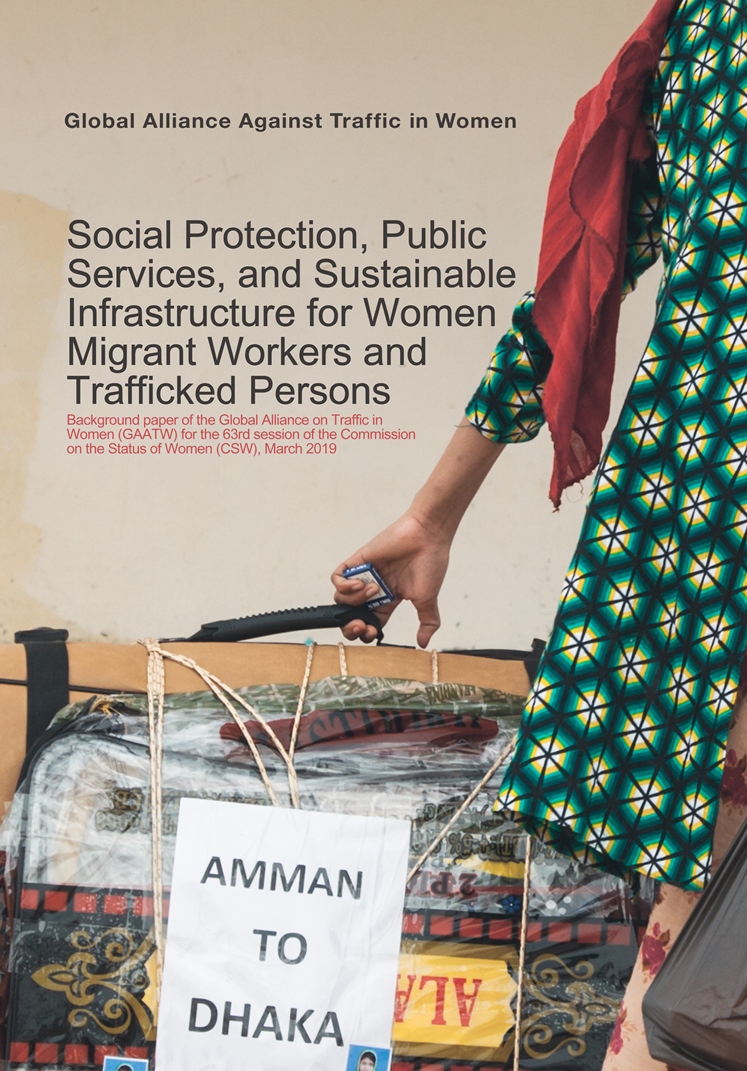Statement by the Global Alliance Against Traffic in Women on the occasion of International Women’s Day and ahead of the 63rd session of the UN Commission on the Status of Women
 The Global Alliance Against Traffic in Women calls on states to increase their investment in public services and social protections as a way to prevent human trafficking and protect the rights of migrant and trafficked women.
The Global Alliance Against Traffic in Women calls on states to increase their investment in public services and social protections as a way to prevent human trafficking and protect the rights of migrant and trafficked women.
Migrant and trafficked women cite the absence of social protection systems as key in their decisions to migrate, regardless of the risk. This distress migration enables a supply of workers in precarious labour sectors, such as the domestic and garment work, which do not enjoy basic protections and increases the risks of trafficking and exploitation.
In destination countries, migrant workers, particularly women domestic and care workers, are often employed to fill gaps in social protection and services, where economic pressures and austerity measures have increased the unpaid care burden on women. In some countries, migrant workers have been recruited to meet longstanding recruitment problems, and make up large sectors of the workforce particularly in health and education.
In origin countries, women migrant workers play a crucial role in compensating for the underfunding or absence of public services. Their remittances are used to clothe, feed, house and educate their families.
Despite playing an outsized, and trans-boundary role in social protection, migrant women are also among the groups least able to access services and social protection. Access to public services and social protection systems are key to the fulfilment of the rights of migrant women, and to preventing trafficking but progress is threatened by budget cuts and austerity measures that have resulted in the privatisation of public services and increased user fees.
Austerity measures, including the underfunding of public services, have a detrimental impact on the ability to prevent, detect and respond to cases of trafficking. Given their role in victim identification, it is critical that public service providers, including labour inspection, law enforcement, immigration, health and social service providers have resources to identify and assist potential trafficked persons.
Towards Social Protection Floors and Affordable, Accessible, Quality, Universal Publicly-funded, Gender-responsive Public Services
A world free from trafficking and exploitation demands a transformed economy — one which works for the many, and not for the few. Economic justice measures can ensure the provision of broad social protection floors for nationals and migrants, in particular women migrant workers, and accessible, affordable, universal, and quality publicly-funded public services.
Therefore, to effectively prevent trafficking and protect the rights of migrant and trafficked women, states must:
- Strengthen the quality, accessibility and affordability of public services by keeping them inclusive of marginalised groups, and in public control.
- Ensure adequate funding for public services to deliver quality services for migrants, refugees and host communities, and ensure that social services for trafficked persons are well-funded, well-coordinated, comprehensive, and non-conditional.
- Establishing mechanisms for the portability of social security entitlements and benefits, for all migrant workers, regardless of sector of work.
- Make no distinction in access to services: All migrants, regardless of status, must be able to access quality public services without fear and on the basis of equal treatment and non-discrimination.
- Implement firewalls: prohibit information sharing between service providers and immigration authorities, so that migrants can access services and report labour abuses without fear of arrest, detention and expulsion.
- Introduce progressive tax policies: Because taxation is a sustainable and predictable source of financing for public services, states need to build fair and strong national tax systems, including progressive taxation for high-earners, higher property tax, eliminate tax incentives for corporates, and curb illicit financial flows, tax avoidance and evasion.
Read the ten-page GAATW position paper on public services here.
